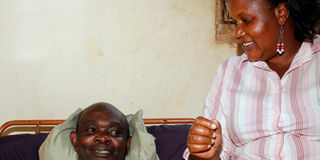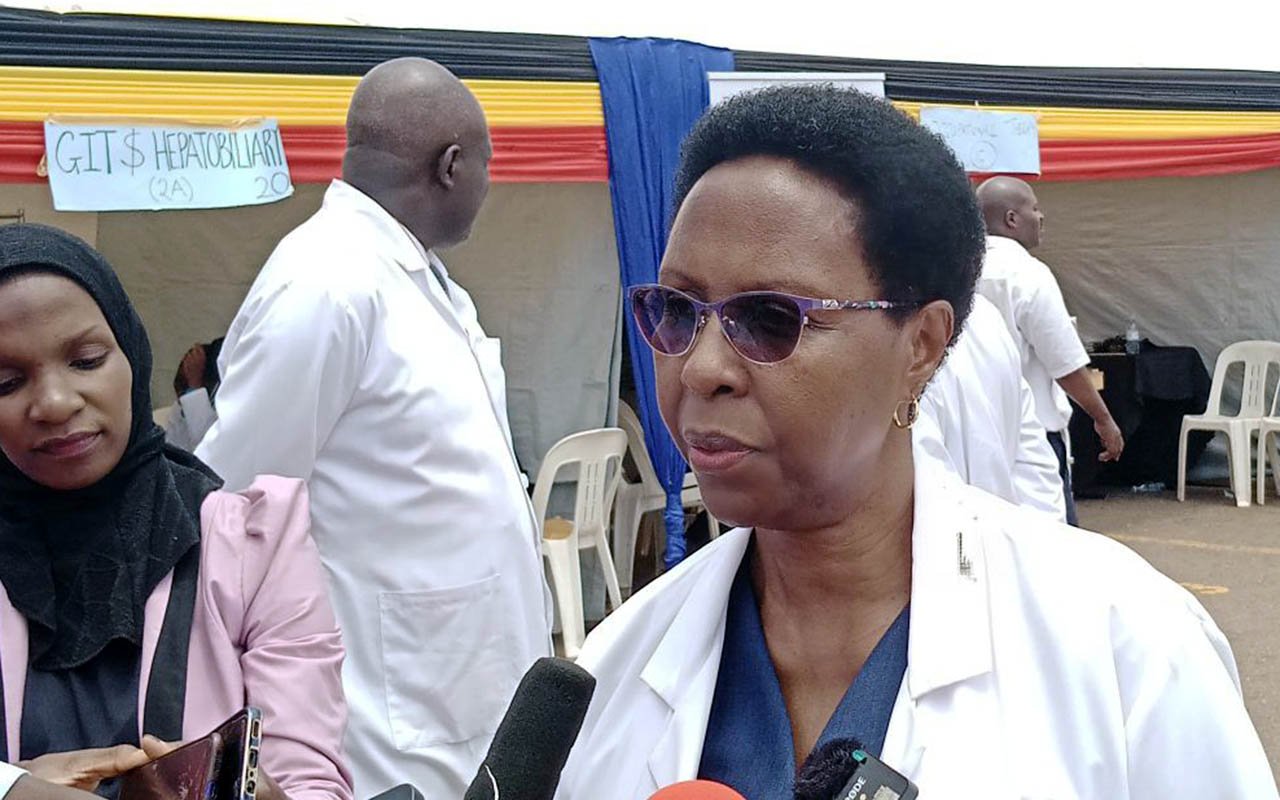Nine years with my paralysed husband

Rose at her husband's bed side.
What you need to know:
Love is patient. Rose Twesigye met Robert Ochen 14 years ago. Together they have two children. After an accident in 2006 that maimed Ochen and left him paralysed, life has never been the same for the couple.
She wears a beaming smile as she welcomes us inside their home. Anyone who would get a chance to see us talk at that moment, would mistake us for old friends. The friendliness of this woman is not farfetched. We are in the home of Rose Twesigye, a woman who has stuck by her husband since he was paralysed in 2006.
Saturday, September 6, will mark nine years since Ochen met his fate. Ushering us into their one-bedroomed house, Twesigye asks us to go straight to the bedroom, which has since turned into their second living room. In there is a chair and two beds.
Ochen lies on one bed. He has neither sat nor stood for the past nine years. His entire body is almost paralysed with only the head, neck and fore-front able to feel.
Rose joyfully introduces us to her husband, who as if aware of why we are there, immediately starts narrating his ordeal.
In many African societies, a man is seen as the head of the home, and is ideally expected to provide for his family. So, the thought of having a physically incapacitated man for nine years is something that will take only a patient and strong woman to do.
Twesigye seems to have become accustomed to the routine of taking care of her husband.
The fun and jokes the two share as they tell their story only paints a picture of a couple that was truly bound by love - it is written allover their eyes, and no condition seems about to steal that away from them.
WHAT LIFE IS LIKE FOR THE COUPLE
Rose: I wake up at 5am, bathe him, prepare myself and then leave for work at 6.20am. We have a maid who helps while I am away doing my private work to fend for the family. I come back between 4pm and 6pm to give him company and help with other house chores.
At first I used to feed, wash and do everything for him, but now he created a handle on the toothbrush, spoon and shaver so he can help himself do a few things.
His spinal cord was totally damaged so he no longer has control over his bladder, therefore, we have to keep changing the catheter that was inserted into him. I am a counsellor so I know a few things, plus his doctor at Mulago hospital also taught me how to change the catheter myself without help.
Robert: My day is almost a routine. I wake up in the morning and brush my teeth. After cleaning me, they turn me on my side and then I can take breakfast, check my email, Facebook and Twitter accounts. After lunch, I am turned on my back again and then I can watch TV. I am again turned at 5.36pm and I stay in that position until supper is done. They used to turn me in the middle of the night, but they don’t anymore.
I rarely go out because my wife cannot manage carrying me out on her own and besides, I only go out when it is sunny and as you people complain on a hot day, I am at my best.
SOMETIMES ROSE HAS ALMOST GIVEN UP
Rose: The first two years were really hard because then, I didn’t have a maid so I had to do all the house chores as well as my private work to fend for the family. By the time I would reach my workplace, I would be so tired and yet I had to do my work fast and go home early. Then I used to leave my baby with a neighbour, who would also help me feed Robert. At least now I have a maid who helps me cook and turn Robert while I am away.
We also face financial challenges in that we cannot even afford professional physiotherapy. A Good Samaritan, Paul Bagaya, who undertook physiotherapy training now visits him thrice a week. St Luke Church, Ntinda has helped a lot after our story was aired on NTV’s Life Stories. People tried to send us money, but the help was short-lived. Someone from the church used to give us Shs60,000 per week but they later stopped.
The daily challenges have often tempted me to move on with my life, especially when I wake up and we do not even have a coin to buy food.
Robert: I was the first to notice that she was getting tired and that is understandable. Before, she used to carry me outside everyday but she now cannot do it alone. She only carries me out with the help of another person. But that is understandable. Nine years is a long time and anybody in her situation would feel the same way.
WE ARE CLOSER BUT I AM INSECURE
Robert: We are now closer because before, I was reserved and always on the move for money, but now, I try and crack some jokes to give her company. (Rose nods in agreement).
Although it has strengthened us, I at times feel jealous and a little insecure about my wife because I am not able to monitor her movements.
We have also learnt to always keep hopeful, gained more trust in God and I have come to love my wife more.
Sometimes, I wish that one of my arms was not paralysed so that I could slap her to prove that I love her since that’s how some African women want love to be proved to them.
But just like any other couple, we sit and talk. She is very talkative. The only difference is that we sleep in different beds.
My biggest fear so far is not being able to walk again because I anticipate harder days to come, and the need to work.
ROSE WAS PREGNANT WHEN THE TRAGEDY OCCURRED
Robert: On September 6, 2006, a friend and I were travelling to Lira District when we got an accident 10 miles to Lira Town. This happened while our driver tried to overtake a trailer. Unfortunately, the truck driver moved to the centre of the road, causing a terrible collision.
Since I was seated at the co-driver’s side, I was nearest to the trailer and took the brunt of the collision more. I was squashed between the trailer and the car door.
I was taken to Lira Hospital, and after five days, I was transferred to Mulago hospital, where I was hospitalised for six months before being discharged.
Results of the tests revealed that I had suffered a closed head injury and dislocation of the cervical vertebral bones in the neck.
Rose: When I heard the news, I was so scared and immediately picked up our six-year-old son Job from home and we boarded the next bus to Lira. Passing the site of the accident, I saw the remains of the mangled vehicle from the bus and found myself screaming with fear. I couldn’t imagine someone surviving that wreckage.
Seeing how devastated I was, a Good Samaritan seated beside me offered to take Job and I to the hospital in a special hire taxi.
At the sight of the bruised, swollen and distorted appearance of his father, Job ran from the room to ask the doctor if that man was truly his father.
I was so frustrated because I could tell he was in a lot of pain. I, however, hoped he would get well in less than a month, only for us to stay in the hospital for six months.
I had never faced such a thing in my life and worst of all, the accident occurred when I was two months pregnant, so I spent the whole six months sleeping on the floor of the hospital. I only left his side to go and deliver our baby.
WHAT KEEPS THEM GOING?
Rose: Trusting in God. It is quite challenging but with faith in God, we find ourselves able to pay rent and take care of daily needs. His family is also very supportive in that they let our daughter Rebecca stay with his sister.
Robert: People come to visit and comfort me. In most cases, we are in here bored so when people come, I get company. The more I talk, the more I exercise my lungs. (Smiles and looks at Rose) I didn’t want to say this but my wife is the reason I am still alive.
There are many things she does that even doctors have not done. She is the only person who can bathe me and of course, as she takes care of me, it hinders her from doing her other personal things. It is like a prison of sorts.
I normally make fun that she would kill me if she just sat there and ignored me for a week. I feel better each day that goes by. Before, I could not feel anything but now I think my fore arms and my waist bone have recovered. In 2012, doctors at Mulago told me that they had done their part and we should leave the rest to God but I have faith that something can still be done.
Efforts to get better
Money constraints: My only challenge is money because I need about $40,000 (about Shs10m) for treatment, travel and upkeep. Even if my entire family sold everything, we couldn’t raise that kind of money. I am still confident that I will one day walk again and be able to do something to support my family.
Failures: Some friends shot a documentary that they posted online to fundraise for me but there is hardly any progress.
To help Ochen: Account number: The Estate of Lameck Otim, 1044100554475, Equity bank; Wandegeya Branch
Contact Rose: 0712693744/0702821891.




